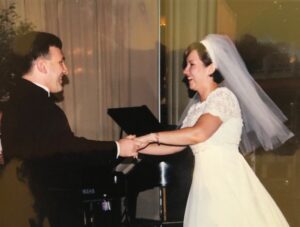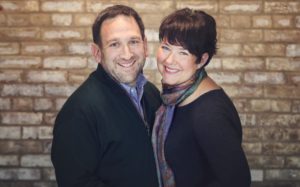We’ve gotten into smoothies. Thanks to a recently acquired Ninja Blender (blatant product plug: it’s great and not all that expensive at Costco), and recipe guidance from our good friend Sherry, we have been churning out delicious concoctions to start many days.
So the other morning we were cleaning up after a delightful mixed-berry smoothie and we couldn’t find the top of the milk container ANYWHERE. We knew it had to be there. We had JUST used it for goodness sake but it was nowhere to be found. Both of us kept moving in circles, opening drawers, lifting cutting boards, looking down the disposal and in the fridge but nope it wasn’t in any of those places. It had completely disappeared. But of course it hadn’t. After about ten minutes of futile searching and eye rolling, it turned up stuck under the top of the blender. We both laughed but we also sighed in virtual unison because this wasn’t close to the first time that we found ourselves feeling more scattered, disorganized and generally unmoored since Cassie’s diagnosis.
There were those times (many, many times) immediately post diagnosis, when Dan went to pay for something only to find that he had none of his credit cards, having left them scattered at different restaurants all across town. Or that time we nearly ran out of gas driving to a doctor’s appointment (thank God we noticed at literally the last moment). Or when we recently lost our checkbook for over three weeks only to find it in the same backpack we had already checked a dozen times. Cassie backed out of the driveway and smashed into our handyman’s car which she had just passed pulling in five minutes earlier. Dan went to get something out of the freezer only to leave a really good box of Sitka salmon (there’s a another product placement for you) out to spoil. The front door is often left open — that’s mostly Dan truth be told — and the degree to which we misplace our phones or get lost driving somewhere we know can’t be overstated.
Now some of this is of course normal (everyone loses their keys and phones right?) and even more so in the midst of a disorienting pandemic. That said, we are both pretty organized people and the frequency that we are losing, forgetting, misplacing and not remembering things is not typical for us. Or rather it is not typical to who we were pre-Metastatic Breast Cancer diagnosis. We sometimes refer to it as “cancer” brain and it impacts us both. It’s so easy to get frustrated and to channel the larger anxieties in our lives on to these smaller lapses. We yell out of exasperation and beat up on ourselves with some regularity and one of us is constantly having to remind the other that this all makes sense. That of course we are going to lose and forget shit because our brains are otherwise consumed with big issues, concerns and fears. It’s requiring us to practice patience, gentleness and self-compassion (none of which come naturally to either of us) and to accept that this is just part of our “now” normal. It’s not a huge deal, especially compared to other challenges, but it’s a pretty constant pain in the ass and just one more reminder of how our lives have changed, in ways big and small, and how we have to practice changing (or at least better accepting ourselves) in response.
P.S. The secret to Sherry’s smoothies is frozen bananas.

